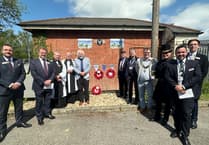MICHAEL Gove is the new secretary of state for levelling up, housing and communities and because of the many concerns about planning issues in South West Surrey, he was the first cabinet minister I asked to see after the recent reshuffle.
We had our meeting last week.
Having grown up in the Surrey Hills, I have always felt passionate about protecting our local countryside.
It is not just because I have been walking dogs (and more recently our lockdown puppy Poppy) for my whole life in our stunning surroundings.
Nor is it just because in an age of screens and devices it is so much more wholesome to get children outside – something so much easier with nature on your doorstep.
The main reason is something else, namely that a decision to develop countryside can never be reversed – and I have always believed the first rule of politics should be to avoid decisions that future generations say was a mistake.
That said, the housing shortage locally is acute and we all feel a responsibility to help young people get on the housing ladder.
Around half the working population commute to London and are potentially able to access higher London salaries – but we would never want to be dormitory towns for London, great city though it is.
We must make it possible for local teachers, nurses and police officers to live locally, whether through buying or renting affordably.
That means we will have to find space for new houses – but it should always be in a way that is environmentally sustainable, consistent with the character of our area and protective of its green spaces.
I discussed many issues relating to planning with Michael Gove, but the particular issue I spent time on concerned Neighbourhood Plans.
When you have a consensus put together painstakingly, as happened not once but twice in Farnham thanks to the efforts of Cllr Carole Cockburn among others, there is understandably a real worry if developers can ignore a referendum result.
Unfortunately this is exactly what can happen when the planning authority, in our case Waverley, fails to meet its obligation to find a five-year housing supply.
At the moment there is a grace period of two years after a Neighbourhood Plan referendum during which time the planning inspectorate has to take note of sites allocated by a Neighbourhood Plan.
However, after that period, if the planning authority cannot demonstrate it has an adequate supply of housing then national policy overrides local policy and there is an expectation that planning permission will be granted on appeal.
Farnham’s Neighbourhood Plan will reach the crucial two-year limit next April, so there is understandably a lot of concern that Waverley does not currently have a five-year housing supply.
The recently-adopted Haslemere Neighbourhood Plan chose not to select sites so the issue is less relevant.
The request I put to Mr Gove was very simple: can the two-year grace period for Neighbourhood Plans be extended to five years?
It seems very unfair that having gone to the effort of putting together a Neighbourhood Plan consistent with the need for new housing, and then securing support for it in a referendum, local people should find their efforts undermined so quickly.
Mr Gove is currently considering the contents of his new housing Bill so I very much hope our discussion will be reflected in whatever is finally proposed to the House of Commons.
As we head into COP26 in Glasgow, we can be proud of having reduced emissions by more than any other major country.
Making sure our approach to new houses is sustainable is a small but extremely important part of that agenda.





Comments
This article has no comments yet. Be the first to leave a comment.